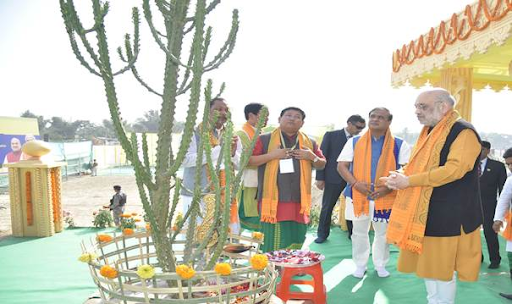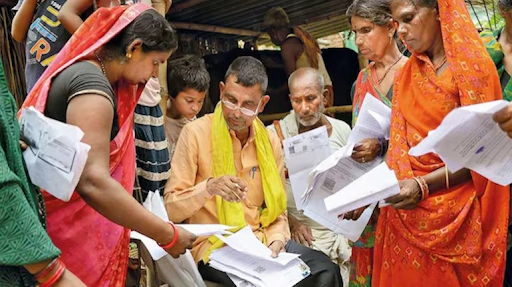



India’s upcoming census officially recognizes the Bathou religion of Assam’s Bodo community with a separate code. Centered on the five elements and venerating the Sijou tree, this nature-based faith strengthens Bodo identity and highlights India’s commitment to preserving indigenous cultural heritage.

Copyright infringement not intended
Picture Courtesy: PIB
The Bathou religion of the Bodo community received a separate code in the upcoming National Census.
Bathouism, the indigenous folk religion of Assam's largest plains tribe, the Bodo people, is centered on five key elements.
The name "Bathou" comes from Bodo words meaning "five" ('Ba') and "deep philosophical thought" ('thou').
Core Beliefs: Bathouism is a monotheistic, nature-centric faith.
The Central Role of the Sijou Plant: The Sijou plant (Euphorbia splendens) is the most sacred symbol in Bathouism.
Validating Identity
It officially recognizes Bathouism as a unique religion, preventing its followers from being miscategorized under generic "Other Religious Persuasion" (ORP) and acknowledging its distinctiveness from mainstream faiths like Hinduism.
Preserving Culture
This recognition is essential for safeguarding Bathou's unique cultural heritage, traditions, and rituals from the assimilative pressures of more dominant religions.
Accurate Demographics
A specific code ensures precise data on Bathou followers, crucial for government policy, resource allocation, and welfare programs for the Bodo community.
Upholding Constitutional Rights
This initiative aligns with India's secular principles and constitutional guarantees of freedom of religion (Article 25) and the right of communities to preserve their distinct culture (Article 29).
Empowerment and Pride
Official recognition strengthens the community's collective voice, promotes a greater sense of pride and belonging, and enhances their ability to advocate for their rights.
Setting a Precedent
This decision sets a strong precedent for other indigenous tribal religions in India, like Sarna Dharma in Jharkhand, which seek similar protective codes.
Lack of Recognition
Most tribal faiths lack a separate religious code. This forces millions of Adivasis to identify as 'Hindu', 'Christian', or as 'Other', leading to an undercount and misrepresentation.
Threat of Assimilation
Without official recognition and support, indigenous belief systems are vulnerable to erosion from the cultural and religious practices of dominant faiths.
Data Gaps for Policy
The absence of specific data hinders the government's ability to create policies tailored to the unique needs of these distinct religious groups.
Homogenizing Pressures
There are often powerful narratives that attempt to subsume tribal religions within larger religious folds, which diminishes their unique heritage and identity.
The recognition of the Bathou religion is a commendable step. To build on this momentum, India should:
Granting a separate census code for the Bathou religion is a significant step in recognizing indigenous cultures. This should prompt a wider policy framework that supports all tribal communities, preserving their heritage in a diverse nation.
Source: ECONOMICTIMES
|
PRACTICE QUESTION Q. Consider the following statements about the Bathou religion:
Which of the statements given above is/are correct? A) 2 only B) 1 and 3 only C) 2 and 3 only D) 1, 2 and 3 Answer: A Explanation: Statement 1 is incorrect. Bathouism traditionally prohibits idol worship; the supreme god Bathoubwrai is considered formless and is represented by the living Sijou tree, not an idol. Statement 2 is correct. The Bodo word "Bathou" is a combination of 'Ba' (five) and 'thou' (deep), referring to the five core principles or elements. Statement 3 is incorrect. The Sijousali is customarily established in the northeast corner of the courtyard, not the southwest. |
It is based on the "five deep philosophical thoughts," representing the five elements of nature: air, fire, earth, water, and sky.
The faith is based on the worship of nature and the five fundamental elements of the world:
The Kherai is a major religious festival of the Bodos that includes a traditional dance and drama. During the Kherai puja, a female shaman called a doudini performs rhythmic dances around the Bathou altar while entering a trance-like state.




© 2026 iasgyan. All right reserved